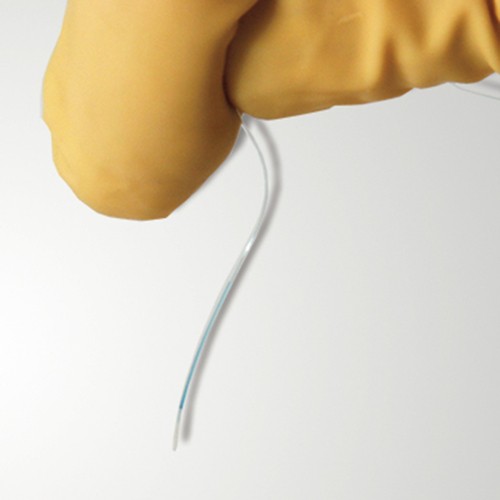Micro Single Hollow Fibre for In-Vivo Dialysis
Product specification
Hollow fibres for in-vivo applications and microdialysis, made of regenerated cellulose, inside diameter 200 µm, outside diameter 216 µm, length approx. 154 mm; working volume approx. 5 µl, flow rate at 10 mmHg about 3 ml/h.
General Information
Use for separation of organic salts (desalination), separation of impurities of low molecular masses (purification), exchange of salts of low molecular masses (buffer exchange).
In principle, all these applications are effected in the same way: Salts and other low molecular weight components diffuse out of the sample from one side of fibre into the dialysing solution. Due to the isotropy of the fibre dissolved substances can diffuse in both directions through the fibre. Particularly suited for dialysis of dissolved substances in a molecular mass range of 500-2000.
THOMAPOR®-hollow fibres are particularly suited for the dialysis of dissolved substances in a molecular mass range of 500-2000. The high permeability of dissolved substances in this range does not involve a high water permeability.
Micro hollow fibre:
For concentration, desalination, and purification of ultramicro and micro amounts of valuable compounds (0.1 - 200 µl). Microsamples up to 0.1 µl can be sucked off in the micro dialysing fibre bundle.
Outstandingly suited for dialysis and filtration are hollow fibres of a smaller diameter with inlet and outlet for samples. The hollow fibres are made of cellulose prepared of cotton linters.
Macro hollow fibre:
The use of hollow fibres in desalination, concentration and fractionation is based on the unique feature of hollow fibres which can be imagined as a molecular sieve with pores the sizes of which can be controlled. Molecules smaller than the pores of the fibre wall can diffuse through it while larger molecules are retained.
The homogenous structure of the fibres allows diffusion of dissolved substances in both directions, either from the inside of the fibre to the outside or vice versa.
Dialysis was used traditionally for separation of salts and other dissolved low molecular weight substances out of biological and biochemical solutions. Many conventional dialysis techniques such as the use of dialysing bags are slower and inconvenient.
The application of hollow fibres allows for instance a 95 % separation of salt out of serum in only 20 minutes.
The hollow fibre units consist of bundles of small (200 µm inner diameter) semipermeable cellulose membrane tubing, which have a high surface/volume ratio compared to a bag.
A large number of hollow fibres per bundle enlarges the effective surface and increases dialysis velocity.
| Item | Image |
Cut off kDalton
|
Anzahl Fasern |
Einheit Stück
|
Price Euro* |
Buy |
|---|---|---|---|---|---|---|
| 58925 |
|
13 | 1 | 20 | 398.00 | |












